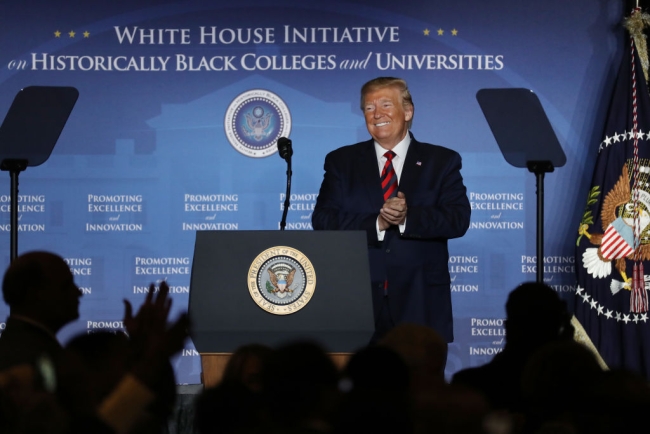You have /5 articles left.
Sign up for a free account or log in.

Getty Images
WASHINGTON -- President Trump said Tuesday that he planned to lift restrictions on capital financing funds for faith-based historically black colleges and seminaries.
The announcement is the latest effort by the administration to demonstrate a special commitment to HBCUs, which have sought to cultivate close ties to the White House since Trump's election -- despite criticism from many of their supporters. It wasn't exactly clear, though, how many colleges, if any, had actually been denied federal funding over those restrictions.
"Previously, federal law restricted more than 40 faith-based HBCUs and seminaries from fully accessing federal support for capital improvement projects," the president said in a speech here Tuesday afternoon. "This meant 40 of your faith-based institutions which had made such tremendous contributions to America were unnecessarily punished for their religious beliefs."
Trump said a Department of Justice opinion released this week declared restrictions on those funds unconstitutional -- a response to the Supreme Court's 2017 ruling in the Trinity Lutheran Church of Columbia v. Comer case, in which the court held denying funding to a religious school for secular purposes violated the First Amendment. He made the announcement at the National HBCU Week Conference in Washington, an event organized annually by the Department of Education.
It wasn't exactly clear after the speech which, if any, colleges could receive new federal funding. Dena Sher, assistant legislative director for public policy at Americans United for Separation of Church and State, said in a statement that the president's comments didn't fully explain the Department of Justice opinion.
"The DOJ said government money can be used to assist HBCUs in funding capital projects that will be used for secular purposes -- while affirming that taxpayer money cannot be used to build college chapels and other facilities that have a religious purpose," she said. "The government cannot establish or build houses of worship -- that would be a fundamental violation of the Constitution."
President Trump also used the occasion to tout accomplishments he said his administration had pursued on behalf of historically black colleges.
He cited his support for restoration of year-round Pell Grants, a change Congress approved in 2017 at the urging of higher ed groups. He also pointed to debt cancellation for colleges in the Gulf Coast region that were affected by Hurricanes Katrina and Rita in 2005.
And he said that 32 federal agencies and departments on Tuesday had made statements of priority promising to work with HBCUs to expand dedicated funding and work with students.
In his second month in office, President Trump made his signature step on historically black colleges, signing an executive order moving the federal HBCU Initiative into the White House and urging federal agencies to pursue more partnerships with those institutions.
"This nation owes a profound and enduring debt of gratitude to its HBCUs," he said Tuesday. "My administration is determined to fight for you and the noble institutions you represent each and every day."
National historically black college groups such as the Thurgood Marshall College Fund and the United Negro College Fund have in turn sought to build a rapport with the White House under Trump. The relationship between black colleges and the administration has been fraught, though, amid opposition from many students and alumni of those institutions, who see the president as racist.
Tensions have manifested in a series of incidents, including just after Trump's election when the Talladega College marching band was criticized by students and alumni for participating in his inauguration parade. Later, Education Secretary Betsy DeVos took blowback over a statement calling HBCUs "pioneers when it comes to school choice." Months after those remarks, undergraduates at Bethune-Cookman University jeered and protested throughout a commencement address by DeVos at the campus.
Even Trump's signing of the executive order was overshadowed by what became a viral image of adviser Kellyanne Conway kneeling on an Oval Office couch with shoes off while HBCU presidents squeezed into a photo with the president.
Despite those flashpoints, leaders of black college groups have insisted their efforts to court the Trump administration have paid off.




